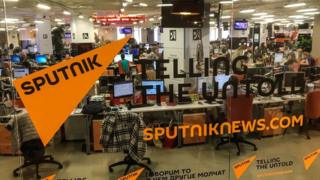Facebook Tackles Russians Making Fake News Stories
 Image copyright Getty Images
Image copyright Getty Images Facebook has removed 500 pages and accounts allegedly involved in peddling fake news in Central Europe, Ukraine and other Eastern European nations.
The action ends efforts by two separate groups to “manipulate people”, said Facebook in a blog.
The accounts had more than 900,000 followers and between them spent more than $160,000 (£124,000) on adverts.
Facebook said the accounts were loosely connected to Russian state groups known to push fake news.
Nest of trolls
The shutdowns hit two separate campaigns that were “engaging in co-ordinated inauthentic behaviour”, it said.
The largest group of pages and accounts was located in Russia but targeted its misleading content across most nations and regions in Eastern Europe.
The organisations running the networks of pages posed as independent news sources and regularly put out information about a variety of subjects including weather, travel, sports, economics and politics.
As well as more general subjects, these pages also regularly wrote about protest movements, anti-Nato sentiment and anti-corruption efforts.
Detective work by Facebook, aided by police and other technology groups, found that many of the people behind these accounts and pages worked for the Russian news agency Sputnik.
The other group of accounts that were removed were also located in Russia, but aimed almost all of their content at Ukraine.
The types of information being spread and the tactics used “shared characteristics” with the campaigns run by Russia’s Internet Research Agency (IRA).
The US government has described IRA as a “troll farm” and said it has ties to the Russian government. In February 2018, 13 people who worked for IRA were indicted by the US and charged with trying to undermine the 2016 US presidential election.
“We’re taking down these pages and accounts based on their behaviour, not the content they post,” said Nathaniel Gleicher, head of cyber-security policy at Facebook, in the blog.
“In these cases, the people behind this activity co-ordinated with one another and used fake accounts to misrepresent themselves, and that was the basis for our action,” he added.
Tackling pages that abuse Facebook was an “ongoing challenge”, said Mr Gleicher.
“The people responsible are determined and well-funded,” he said. “We constantly have to improve to stay ahead.”
READ MORE HERE
